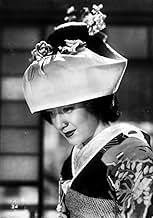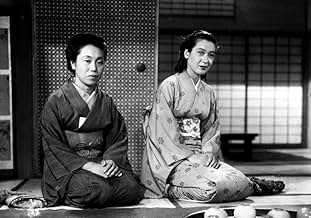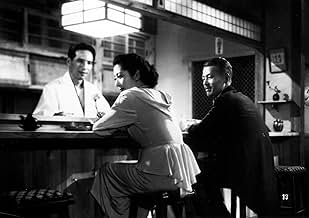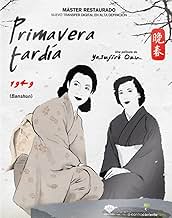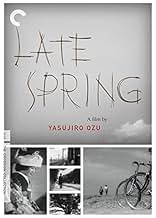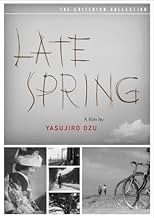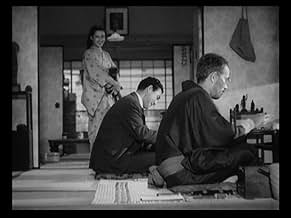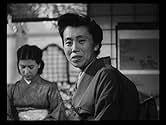Several people try to talk 27-year-old Noriko into marrying, but all she wants is to keep on caring for her widowed father.Several people try to talk 27-year-old Noriko into marrying, but all she wants is to keep on caring for her widowed father.Several people try to talk 27-year-old Noriko into marrying, but all she wants is to keep on caring for her widowed father.
- Director
- Writers
- Stars
- Awards
- 5 wins total
- Shige
- (as Toyoko Takahashi)
- Director
- Writers
- All cast & crew
- Production, box office & more at IMDbPro
Featured reviews
The film is made in 1949, four years after the defeat of Japan, but there are no ruins in sight, on the contrary, landscapes are proper and well maintained, homes are clean and nothing seems to be missing, people live their lives in a way that seems to go on for centuries. The American presence is just hinted by a Coca-Cola sign, or English inscriptions at train stations. Maybe a political statement by Ozu about the perennial continuity of the Japanese civilization despite the destruction Japan had just gone through.
The war is also hardly remembered and hidden back in the past. We learn that the principal hero Noriko (wonderfully acted by Ozu's preferred actress of the period Setsuko Hara) was interned in a labor camp during the war, but nothing in her demeanor and certainly not her radiant smile lets anybody feel about her suffering. She loves being at home and taking care of her father (Chishu Ryu, another favorite actor of Ozu) with a devotion that is troubled only by the insistence of the family to get her married, as social customs demand for a young woman of her age. Eventually she will be curved into accepting a marriage arrangement under pressure by her caring aunt and by her father, who would make anything to have her happy, but only according to the customs and their own conceptions.
It's wonderful to watch how this delicate family drama is being filmed, with a taste and aesthetic balance that makes of each scene a masterpiece worth being seen for its own. Ozu is also a master of using soundtrack, and his matching of visuals and sound sometimes equally effective in creating emotion reminds the use that Hitchcock makes of music in his films.
There is a lot of symbolism in this movie, and I certainly have lost some of the more subtle messages because of my lack of familiarity with Japanese customs and culture. And yet this film is at the same time simple, as well as modern and universal in look, we can resonate with the characters and I had less difficulty in understanding their emotions than in many other Japanese or Far East movies seen through the perspective of my 'western' eyes. At the same time the film has a wonderful human dimension, we can see on screen a story of love and affection between two people who need and are willing to make a huge sacrifice in order for the other one to be happy. This combination of emotions, simplicity and art cinema makes of this movie a real treat.
Sincerely, I urge anybody that love cinema to see this one, quite simply one of the greatest films I have seen. 10/10
Did you know
- TriviaMost of the movie takes place in Kita-Kamakura, about 30 miles from downtown Tokyo. Several years after the release of the film, the director, Yasujirô Ozu, moved with his mother to the area and spent the rest of his life there. (His tomb is also located there.) Furthermore, the film's star, Setsuko Hara, also eventually moved to the area and, as of May 2013, reportedly still lived there under her birth name, Masae Aida.
- GoofsA camera/dolly shadow is visible on the sidewalk as it follows Noriko walking.
- Quotes
Shukichi Somiya: Marriage may not mean happiness from the start. To expect such immediate happiness is a mistake. Happiness isn't something you wait around for. It's something you create yourself. Getting married isn't happiness. Happiness lies in the forging of a new life shared together. It may take a year or two, maybe even five or ten. Happiness comes only through effort. Only then can you claim to be man and wife.
- ConnectionsFeatured in Shôchiku eiga sanjû-nen: Omoide no album (1950)
- How long is Late Spring?Powered by Alexa
Details
- Release date
- Country of origin
- Official site
- Language
- Also known as
- Kasno proljece
- Filming locations
- Production company
- See more company credits at IMDbPro
Box office
- Gross US & Canada
- $13,254
- Opening weekend US & Canada
- $6,456
- Mar 6, 2016
- Gross worldwide
- $19,681
- Runtime
- 1h 50m(110 min)
- Color
- Sound mix
- Aspect ratio
- 1.37 : 1


